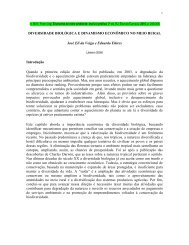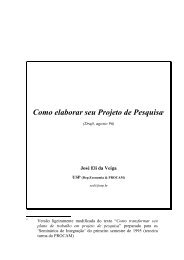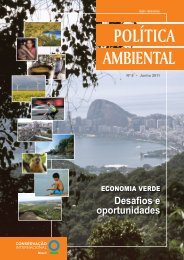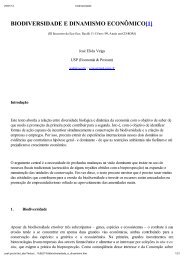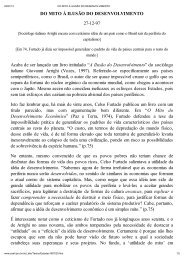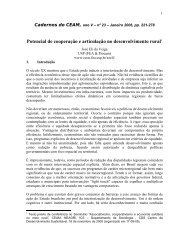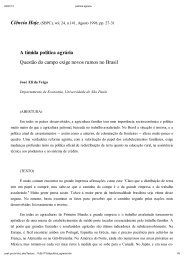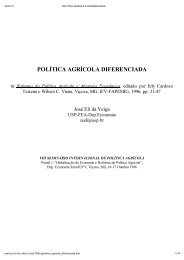sustainable development 20 years on from the ... - José Eli da Veiga
sustainable development 20 years on from the ... - José Eli da Veiga
sustainable development 20 years on from the ... - José Eli da Veiga
You also want an ePaper? Increase the reach of your titles
YUMPU automatically turns print PDFs into web optimized ePapers that Google loves.
245<br />
Indicators can help to raise awareness of <strong>the</strong> statistical informati<strong>on</strong> available to support decisi<strong>on</strong>making<br />
and draw attenti<strong>on</strong> to remaining gaps. In this instance, <strong>the</strong> regi<strong>on</strong>’s countries can draw <strong>on</strong> <strong>the</strong>ir<br />
experiences in developing <strong>the</strong> indicators for <strong>the</strong> Millennium Development Goals and in formulating<br />
regi<strong>on</strong>al <str<strong>on</strong>g>sustainable</str<strong>on</strong>g> <str<strong>on</strong>g>development</str<strong>on</strong>g> goals and follow-up indicators (see guideline 4, point (e)) under <strong>the</strong><br />
Latin American and Caribbean Initiative for Sustainable Development (ILAC), which was organized<br />
under <strong>the</strong> auspices of <strong>the</strong> ministries of envir<strong>on</strong>mental affairs in <strong>the</strong> countries of Latin America and <strong>the</strong><br />
Caribbean, <strong>the</strong> United Nati<strong>on</strong>s Envir<strong>on</strong>ment Programme (UNEP) and ECLAC.<br />
Investments must be made in disseminating informati<strong>on</strong>, with a view to creating resources that<br />
serve <strong>the</strong> purposes of different users, through reports, compilati<strong>on</strong>s and o<strong>the</strong>r materials, and that make use<br />
of a variety of media, including <strong>the</strong> Internet. Examples of how this can be d<strong>on</strong>e include <strong>the</strong><br />
comprehensive envir<strong>on</strong>mental evaluati<strong>on</strong>s in <strong>the</strong> Global Envir<strong>on</strong>mental Outlook reports published by<br />
UNEP and <strong>the</strong> steps taken by ECLAC to expand statistical capacity and make <strong>da</strong>ta available to <strong>the</strong> public<br />
through <strong>the</strong> CEPALSTAT <strong>da</strong>tabase.<br />
The use of <strong>the</strong> Internet has helped significantly to make envir<strong>on</strong>mental informati<strong>on</strong> systems<br />
accessible to a wider public, but additi<strong>on</strong>al efforts are needed to reach disadvantaged groups, rural<br />
populati<strong>on</strong>s and indigenous communities with limited access to <strong>the</strong> Web.<br />
Guideline 6<br />
Formulate better policies based <strong>on</strong> a more informed, participatory process<br />
As menti<strong>on</strong>ed in chapter III, <strong>the</strong> regi<strong>on</strong> has made great strides towards establishing legal and instituti<strong>on</strong>al<br />
frameworks to guarantee citizens’ access to informati<strong>on</strong> and justice and to mechanisms for citizen<br />
participati<strong>on</strong> in decisi<strong>on</strong>-making <strong>on</strong> <strong>the</strong> natural resources sustaining <strong>the</strong>ir communities. Never<strong>the</strong>less,<br />
challenges remain.<br />
For citizens to participate in an informed manner in such decisi<strong>on</strong>-making, countries must, as<br />
established under guidelines 2 and 5, streng<strong>the</strong>n <strong>the</strong>ir capacity to produce, process and disseminate<br />
envir<strong>on</strong>mental and <str<strong>on</strong>g>sustainable</str<strong>on</strong>g> <str<strong>on</strong>g>development</str<strong>on</strong>g> statistics and indicators at <strong>the</strong> nati<strong>on</strong>al level. However, it is<br />
not enough to extend <strong>the</strong> supply of strategic envir<strong>on</strong>mental informati<strong>on</strong> solely am<strong>on</strong>g decisi<strong>on</strong>-makers;<br />
demand also has to be built up at a strategic level in each strata of society in order to guarantee <strong>the</strong> use of<br />
<strong>the</strong> envir<strong>on</strong>mental informati<strong>on</strong> outputs (Quiroga, <str<strong>on</strong>g>20</str<strong>on</strong>g>05). Educati<strong>on</strong> <strong>the</strong>refore plays a key role in<br />
developing citizen demand for more and better informati<strong>on</strong> and participati<strong>on</strong> (see guideline 7). Promoting<br />
leadership can also help to encourage citizens to demand <strong>the</strong>ir right to participate in decisi<strong>on</strong>-making<br />
processes. In this c<strong>on</strong>text, encouraging women, indigenous and young pers<strong>on</strong>s to take <strong>on</strong> leadership roles<br />
is <strong>the</strong>refore key to ensuring <strong>the</strong> <str<strong>on</strong>g>development</str<strong>on</strong>g> of inclusive policies that resp<strong>on</strong>d to <strong>the</strong> needs of groups that<br />
are typically excluded <strong>from</strong> decisi<strong>on</strong>-making processes.<br />
Providing access to informati<strong>on</strong> <strong>on</strong> <strong>the</strong> resp<strong>on</strong>sible use of resources, such as water, is <strong>the</strong> first step<br />
towards raising public awareness and thus facilitating participati<strong>on</strong> in resource management in line with<br />
principle 10 of <strong>the</strong> Rio Declarati<strong>on</strong>. In order to do so, reliable, relevant, objective, up-to-<strong>da</strong>te informati<strong>on</strong><br />
has to be compiled and made readily accessible to ensure transparency. Such informati<strong>on</strong> helps people to<br />
understand <strong>the</strong> issues and thus c<strong>on</strong>tributes to more effective management. Educating <strong>the</strong> public in this<br />
respect can promote envir<strong>on</strong>mental values and help to streng<strong>the</strong>n public participati<strong>on</strong>, which will, in turn,<br />
c<strong>on</strong>tribute to priority-setting and <strong>the</strong> adopti<strong>on</strong> of measures needed to achieve a <str<strong>on</strong>g>sustainable</str<strong>on</strong>g> form of natural



